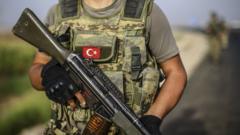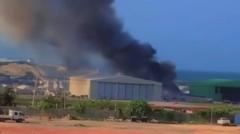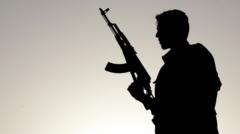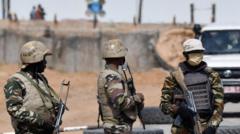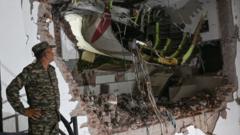On Wednesday morning, a bomb exploded on a school bus in Balochistan, leading to the deaths of four students and two adults. Authorities indicate that militant groups are increasingly targeting vulnerable populations, emphasizing the need for heightened security in the area.**
Tragic Bombing Targets School Bus in Pakistan's Balochistan, Killing Six**

Tragic Bombing Targets School Bus in Pakistan's Balochistan, Killing Six**
A bomb attack in Pakistan's Balochistan Province has claimed the lives of six individuals, including four schoolchildren, highlighting ongoing violence in the region.**
The southwestern province of Balochistan in Pakistan has once again witnessed a tragic act of violence, as a bomb blast targeting a school bus resulted in the deaths of at least six people, four of whom were children. The attack occurred on Wednesday morning, raising alarms over the safety of educational institutions in a region fraught with insurgent activity.
Sarfraz Bugti, the chief minister of Balochistan, confirmed during a press conference in Quetta that the school bus was carrying 46 students to a military-run educational facility at the time of the explosion. Alongside the fatalities of the young students, the driver and a helper of the bus also lost their lives, while several others sustained injuries as a result of the attack.
"This is a calculated strike," Mr. Bugti stated, noting that militant groups appear to be increasingly targeting civilian vulnerabilities in their ongoing campaigns. The incident took place in the Khuzdar district, roughly 180 miles south of Quetta, situated along a crucial route linking Quetta to Karachi, Sindh's capital.
Officials reported that the bombing was executed using a vehicle-borne improvised explosive device (VBIED), a method that has seen resurgence in similar attacks across the region. The targeting of schoolchildren signals a worrying shift in tactics, suggesting that militants may be seeking to instill fear and disrupt stability by striking at the heart of education and youth.
Authorities have expressed concerns that the security situation in Balochistan continues to deteriorate, as violent confrontations and acts of terror rise in numbers. In response to these incidents, there have been calls for enhanced security measures to protect not just students but also other vulnerable communities in the province.
Balochistan has long been a hotspot for a variety of separatist and extremist groups, and the recent attacks highlight the urgent need for political engagement and effective counter-terrorism strategies to ensure safety for all citizens, particularly the most innocent among them.
Sarfraz Bugti, the chief minister of Balochistan, confirmed during a press conference in Quetta that the school bus was carrying 46 students to a military-run educational facility at the time of the explosion. Alongside the fatalities of the young students, the driver and a helper of the bus also lost their lives, while several others sustained injuries as a result of the attack.
"This is a calculated strike," Mr. Bugti stated, noting that militant groups appear to be increasingly targeting civilian vulnerabilities in their ongoing campaigns. The incident took place in the Khuzdar district, roughly 180 miles south of Quetta, situated along a crucial route linking Quetta to Karachi, Sindh's capital.
Officials reported that the bombing was executed using a vehicle-borne improvised explosive device (VBIED), a method that has seen resurgence in similar attacks across the region. The targeting of schoolchildren signals a worrying shift in tactics, suggesting that militants may be seeking to instill fear and disrupt stability by striking at the heart of education and youth.
Authorities have expressed concerns that the security situation in Balochistan continues to deteriorate, as violent confrontations and acts of terror rise in numbers. In response to these incidents, there have been calls for enhanced security measures to protect not just students but also other vulnerable communities in the province.
Balochistan has long been a hotspot for a variety of separatist and extremist groups, and the recent attacks highlight the urgent need for political engagement and effective counter-terrorism strategies to ensure safety for all citizens, particularly the most innocent among them.

